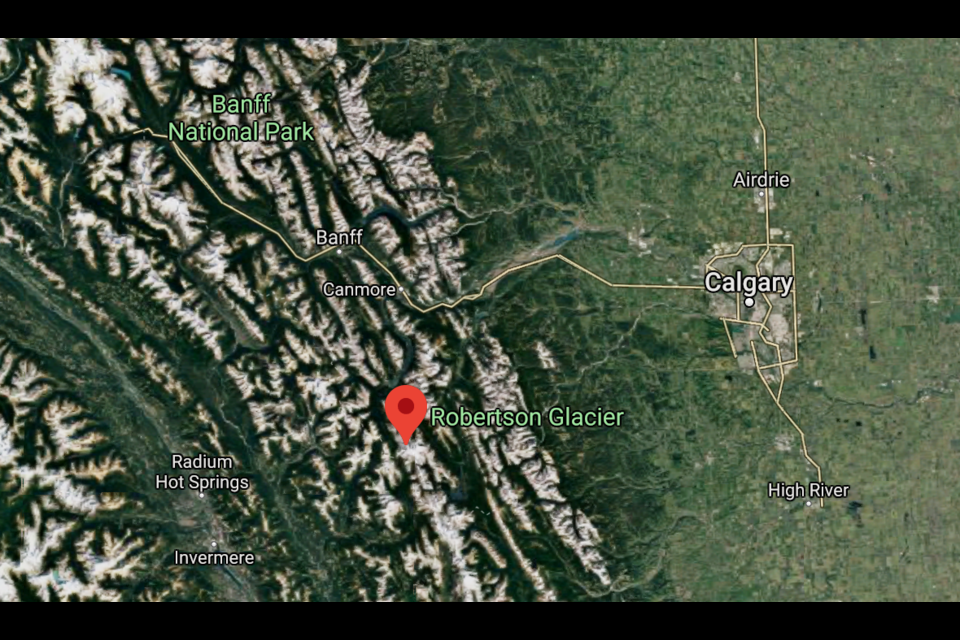KANANASKIS – A backcountry skier who suffered a serious head injury in an accident near Robertson Glacier in Kananaskis Country on Monday (Oct. 19) died in his friend's arms.
The man, identified by friends as Konan Wendt, was out for the day with three friends when tragedy struck at about 2:30 p.m. due to the low early season snow coverage and related rocky hazards in very low angle ski terrain.
Patrick Skelton said his friend had suffered a traumatic brain injury.
“He passed in my arms ... his helmet was in his backpack,” he wrote on a Facebook post.
Kananaskis Public Safety specialists say the Invermere man’s skis bottomed out, forcing him to pitch forward into a rocky area.
“He was thrown forward into rocky terrain and suffered quite a bit of trauma from that,” said Jeremy Mackenzie, a public safety specialist and team leader for the Kananaskis region.
“We don’t know the exact nature of the injuries… a helmet would have certainly helped prevent some of the injuries, but of course we’ll never know if it would have prevented everything.”
Friends say the group – all with more than 10 years experience in the backcountry – turned around about 100 metres below the col because they didn’t like the weather and hazards, deciding to play it safe and ski down to low angle terrain.
“When we got lower onto very low angle terrain in the moraine, my friend Konan Wendt caught an edge and went head first into a rock,” said Wendt's friend.
The skiers immediately triggered their inReach satellite communication device and also made contact with Kananaskis Pubic Safety via an ACMG radio channel.
Within 30 minutes of making contact with KPS, rescue crews and Alpine Helicopters were at the site near the glacier. The group of skiers had stomped out a landing pad to make it easier for the helicopter to land in snow and poor visibility.
“While they were getting to us, we stabilized him, built a stretcher with his split-board and an emergency tarp,” said Skelton, noting they treated their friend’s wound, cleared his airway and started performing CPR.
“Unfortunately there was nothing that we or anyone else could of done short of him taking that fall in an ICU.”
Once rescue crews arrived, they too tried to help Wendt with the use of an AED and another machine that does automatic compressions.
Mackenzie said public safety specialists were extremely impressed with the level of First Aid care the skier received from his friends, adding the work they did to make it safe for the helicopter to land also made it possible for a faster response.
“We flew him out to paramedics as soon as we could,” he said, noting they met Kananaskis Emergency Services at the Burstall Pass trailhead.
“Ultimately, paramedics weren’t able to do anything more for him.”
Everyone in the group on Monday had avalanche training, mountaineering experience, wilderness First Aid training, carried medical supplies, emergency supplies, radios, and an inReach device.
Skelton implored backcountry enthusiasts to be careful this winter.
“Wear your helmet. Take an avalanche course. Carry emergency supplies. Take a first aid course,” he said.
According to KPS, 10-30 cm of snow currently exists at tree-line, which doesn’t fully cover rocks or any of the ground debris.
Mackenzie said if you do fall in these areas, you will likely get hurt, noting the chance of hitting something and getting injured is quite high.
“It’s early season and because the snow does not have much structure or much depth, you’re going to be penetrating with skis or feet into rocks and grass and logs below,” said Mackenzie.
It’s not unusual for KPS to respond to early season skiing injuries at this time of year because of low snow coverage.
“It’s also not unusual for people to be excited when first snow comes, but with COVID, we’re seeing very, very large volumes of people over the weekend and there was extensive skiing that occurred,” said Mackenzie.
“You are risking a season-ending injury, or unfortunately, this incident showed it could be worse.”
Out in the field on Monday, forecasters witnessed many loose, dry avalanches coming off steep terrain, though the slides did not run far.
They say consequences of being caught in even a small avalanche would result in injury due to the lack of snow and the chance of a ride over rocky terrain.
“Even a small avalanche at this time of year can become a really nasty ride,” said Mackenzie.
“Getting raked across the rocks and ice, it’s a very high likelihood you’ll have an injury.”
In addition, Mackenzie said it is not uncommon to have an early season avalanche fatality.
“Ice climbers, scramblers, backcountry skiers, hikers need to be aware that this is a transition time and the early part of the avalanche season,” he said.




